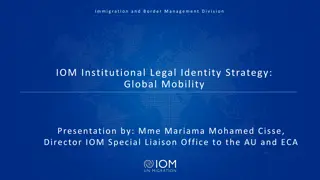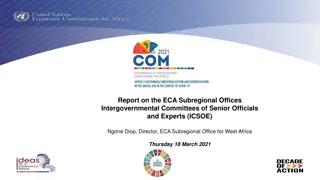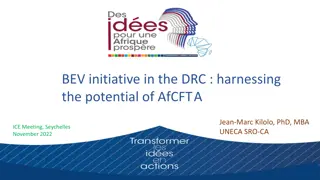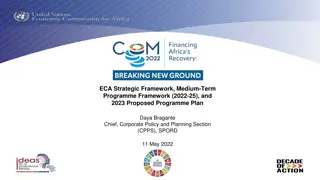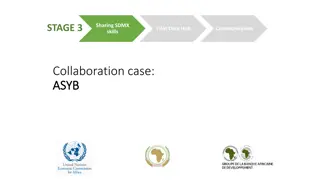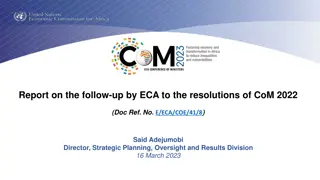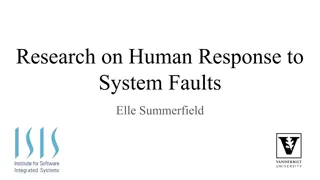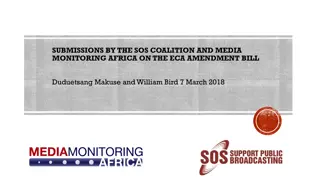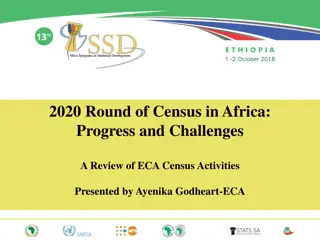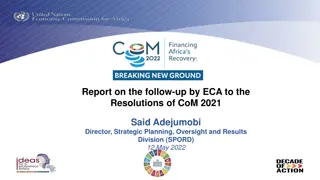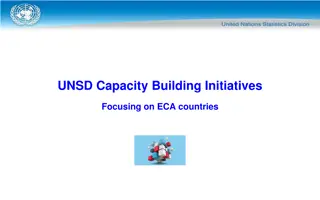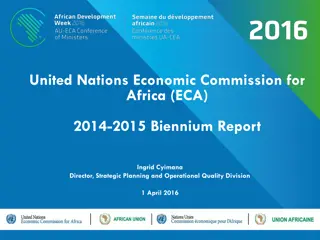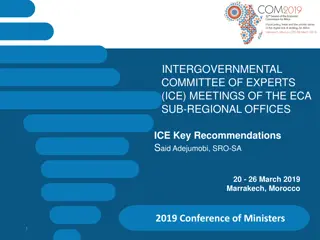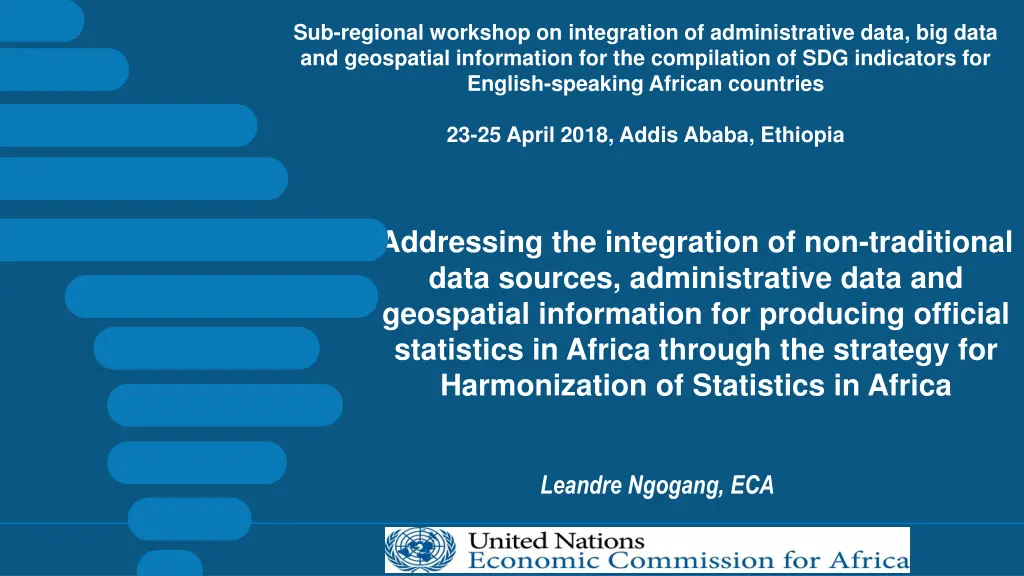
Addressing Challenges in African Statistics Systems for Integration of SDG Indicators
Explore the challenges and opportunities facing African statistics systems in integrating administrative data, big data, and geospatial information for compiling SDG indicators. The workshop in Addis Ababa highlighted the importance of harmonizing statistical data to support African integration programs and development agendas.
Download Presentation

Please find below an Image/Link to download the presentation.
The content on the website is provided AS IS for your information and personal use only. It may not be sold, licensed, or shared on other websites without obtaining consent from the author. If you encounter any issues during the download, it is possible that the publisher has removed the file from their server.
You are allowed to download the files provided on this website for personal or commercial use, subject to the condition that they are used lawfully. All files are the property of their respective owners.
The content on the website is provided AS IS for your information and personal use only. It may not be sold, licensed, or shared on other websites without obtaining consent from the author.
E N D
Presentation Transcript
Sub-regional workshop on integration of administrative data, big data and geospatial information for the compilation of SDG indicators for English-speaking African countries 23-25 April 2018, Addis Ababa, Ethiopia Addressing the integration of non-traditional data sources, administrative data and geospatial information for producing official statistics in Africa through the strategy for Harmonization of Statistics in Africa Leandre Ngogang, ECA
Sub-regional workshop on integration of administrative data, big data and geospatial information for the compilation of SDG indicators for English- speaking African countries 23-25 April 2018 CR6, UNCC, Addis Ababa, Ethiopia Addressing the integration of non-traditional data sources, administrative data and geospatial information for producing official statistics in Africa through the strategy for Harmonization of Statistics in Africa L andre Ngogang, ECA
Introduction Challenges of African Statistics Systems Institutional weaknesses such as inadequate financing and use of statistics in policy making as well as poor management and institutional capacity within statistical bodies themselves; Organizational weaknesses such as poor quality and management of data, weakness in data analysis and poor dissemination and access to information produced. Opportunities SDGs Agenda 2063 The Imperative need for comparative data for the integration process and measurement of development Data revolution The emergence of new data sources, greater acknowledgment of the need to integrate geospatial and statistical information
Why SHaSA? Need to address all of the challenges face by the African Statistical Systems in a drive to support the African integration program alongside national, regional, continental, and international development agendas Need to provide users with quality harmonized statistical information in all areas of integration in order to foster better formulation and effective monitoring of Integration and development, according to the timelines of the different agendas.
What is SHaSA? Objective is to address all of ASS challenges in a drive to support the African integration program alongside national, regional, continental, and international development agendas Vision: "An efficient statistical system that generates reliable, harmonized and timely statistical information covering all dimensions of political, economic, social, environmental and cultural development and integration of Africa Expected outcomes: Adoption of common international norms adapted to African realities; Better coordination of development efforts and the sustainable production of a wide range of harmonized statistics in order to inform political decisions and measure progress made in the implementation of development agendas The strategy is structured on four strategic themes i. ii.
Strategic themes and objectives of SHaSA II SO1.1: To expand the statistical information base SO1.2: To transform existing statistics for comparability SO1.3: To harmonise standards and methods of statistical production SO2.1: To establish effective coordination and collaboration mechanisms SO2.2: To define statistical priorities for the implementation of integration and development agendas SO3.1: To reform and enhance national statistical systems SO3.2: To reform and enhance regional and continental statistical systems SO3.3: To Develop sustainable statistical capacities SO3.4: To Establish an effective technological environment SO4.1: To drive evidence-based decisions through the use of statistics SO4.2: To improve the communication of statistical information ST1: To produce quality statistics for Africa ST2: To Coordinate the Production of Quality Statistics for Africa ST3: To develop sustainable institutional capacities of the African statistical system ST4: To Promote a culture of quality policy and decision-making
Implementation Specialized Technical Groups prepare and implement sectoral action plans for statistical harmonization develop and / or adopt international standards and methodological guidelines for statistical harmonization in their respective fields Lead Countries or Champions Important role of key stakeholders (StatAfric, statistical training centres, etc.) Partnerships
Specialized Technical Groups No Specialized Technical Groups STG-GPS (Governance, Peace and Security) STG-ES. External Sector (External Trade and Balance of Payments) STG-MF (Money and Finance) Secretariat AUC/AfDB 01 AUC/AACB 02 AACB/ 03 STG-NA&P (AGNA) (National Accounts and Price Statistics) ECA/AfDB/ AUC 04 STG-II&T. (Infrastructure, Industries & Tourism) STG-PFPS&I. (Public Finance, Private Sector and Investment) STG-STE. (Science, Technology & Education) STG-So. Demography, Migration, Health, Human Development, Social Protection & Gender STG-Env. (Agriculture, Environment, Natural Resources, & Climate Change) AfDB/NEPAD 05 AfDB 06 AUC/ACBF/NEPAD 07 08 ECA/AUC AfDB/AUC 09
Specialized Technical Groups No 10 11 12 13 14 15 16 17 18 Specialized Technical Groups Secretariat STG-CB (AGROST). Statistical Training and Capacity Building. ECA/ACBF/AUC STG-Labor and Informal Sector Statistics STG-Classification STG-Statistics on Civil Registration STG-Sustainable Development STG-ICT for Statistical Production STG-Mobilization of Political Will STG-Emerging Statistical Issues STG-National Strategies for the Development of Statistics AUC/AfDB/AFRISTAT ECA/ AFRISTAT ECA/AUC AUC/AfDB/ECA AfDB/AUC AUC/AfDB AfDB/ECA/ACBF AUC/AfDB/ECA
Administrative date and Non-tradition data sources in SHaSA Four strategic objectives (SO1.1, SO1.2, SO1.3, SO3.1) out of eleven addressed non-traditional in official statistics SO1.1: To expand the statistical information base: aims to broaden the existing statistical information base to cover all areas of Africa s integration and development. improve administrative data and take advantage of new and innovative data sources to fill the data gap and respond to data demand in new areas SO1.2: To transform existing statistics for comparability: Improve administrative data to ensure their comparability
Administrative date and Non-tradition data sources in SHaSA (Cont d) SO1.3: To transform existing statistics for comparability : Apply agreed standards on administrative an non-traditional data SO3.1: To reform and enhance National Statistical Systems: adoption of statistical laws and regulatory frameworks in line with the African Charter on Statistics; development and implementation of NSDS; organization of peer reviews; establishment of adequate and sustainable funding for statistical activities, etc. Appropriate legal framework to improve the use of administrative and non-traditional data in official statistics
Thanks For questions and comments: L andre Ngogang African Centre for Statistics Economic Commission for Africa ngogangwandji@un.org


